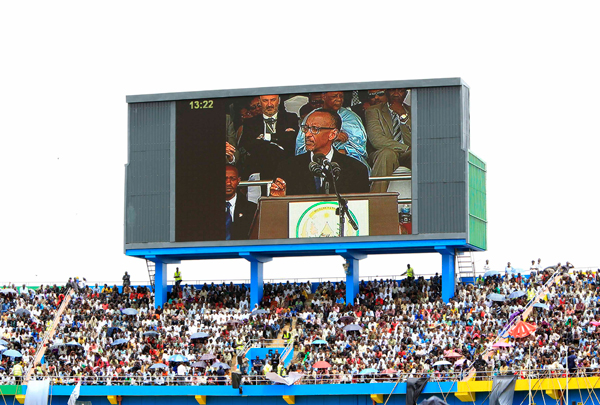Reply To:
Name - Reply Comment
Last Updated : 2024-04-18 13:32:00
.jpg) Twenty years ago, the United Nations and the Western powers failed to stop the Rwandan genocide that was taking place under their very boots. There was UN and Western presence in Rwanda when 800,000 minority ethnic Tutsis were killed by the militia from the majority Hutu community. The systematic massacre did not take place in a day or a week. It started on April 6 and went on for nearly three months. The world powers showed little interest in the bloodbath in Rwanda while the Western media under-reported the violence or did not report it at all. For Rwanda is not as important as oil-rich Iraq or strategically located Syria or Russia-ramming Ukraine.
Twenty years ago, the United Nations and the Western powers failed to stop the Rwandan genocide that was taking place under their very boots. There was UN and Western presence in Rwanda when 800,000 minority ethnic Tutsis were killed by the militia from the majority Hutu community. The systematic massacre did not take place in a day or a week. It started on April 6 and went on for nearly three months. The world powers showed little interest in the bloodbath in Rwanda while the Western media under-reported the violence or did not report it at all. For Rwanda is not as important as oil-rich Iraq or strategically located Syria or Russia-ramming Ukraine.
.jpg) Three months before the genocide, the then UN Secretary General, Kofi Annan, was warned of it by UN peacekeeping mission chief Romeo Dallaire in a secret cable, but Annan’s follow-up action was wanting. Annan failed to share the cable with the Security Council. In fact, the cable was the second such warning. In August 1993, a team of UN human rights investigators had warned of a genocide in the making.
Three months before the genocide, the then UN Secretary General, Kofi Annan, was warned of it by UN peacekeeping mission chief Romeo Dallaire in a secret cable, but Annan’s follow-up action was wanting. Annan failed to share the cable with the Security Council. In fact, the cable was the second such warning. In August 1993, a team of UN human rights investigators had warned of a genocide in the making..jpg) A report compiled by an independent investigation panel appointed by the Rwandan government has accused France of arming, training and advising Hutu extremists prior to and during the massacre. It even charged that French troops also took part in the massacre.
A report compiled by an independent investigation panel appointed by the Rwandan government has accused France of arming, training and advising Hutu extremists prior to and during the massacre. It even charged that French troops also took part in the massacre..jpg)

Add comment
Comments will be edited (grammar, spelling and slang) and authorized at the discretion of Daily Mirror online. The website also has the right not to publish selected comments.
Reply To:
Name - Reply Comment
On March 26, a couple arriving from Thailand was arrested with 88 live animal
According to villagers from Naula-Moragolla out of 105 families 80 can afford
Is the situation in Sri Lanka so grim that locals harbour hope that they coul
A recent post on social media revealed that three purple-faced langurs near t

10 Apr 2024
09 Apr 2024